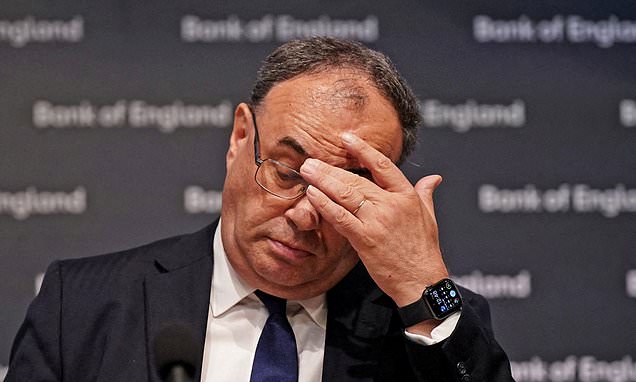
By Patrick Tooher And Luke Barr, Financial Mail On Sunday
Updated: 21:50 27 May 2023
- Bank poised to intervene if chaos in the bond market persists
- Beleaguered governor Bailey faces even more embarrassment
- Latest sell-off in gilts is being laid squarely at Bailey’s door
The Bank of England is poised to intervene if last week’s chaos in the bond market persists – as beleaguered governor Andrew Bailey faces even more embarrassment.
The Old Lady was forced to step in last autumn to save the pensions industry from collapse with the promise of a £65 billion package, following an earlier episode of bond market turmoil after Liz Truss’s ill-fated mini-Budget.
This time the sell-off in gilts – UK government bonds or IOUs – is being laid squarely at Bailey’s door.
He is being blamed for failing to curb inflation and trying to pass off rampant price rises as a transitory phenomenon that would correct itself.
The Bank has raised interest rates a dozen times in a row in a bid to keep inflation in check. But last week’s higher-than-expected figure of 8.7 per cent – way more than the Bank’s 2 per cent target – spooked investors and prompted them to sell gilts. ‘Bailey is not well-equipped to deal with the major monetary policy crisis that we have at the moment,’ said Andrew Sentance, a former member of the Bank’s rate-setting committee, which sets interest rates.
‘We’re paying the price for the Bank’s slow action [and] they are not properly acknowledging their role,’ he added.
Tory MP and former Trade Minister Liam Fox said: ‘The Bank of England took their eye off the ball on inflation and maintained loose monetary conditions for too long.’
Experts warn that any further hikes in the base rate of 4.5 per cent could break the pensions sector while heaping more pain on 1.3 million homeowners re-mortgaging this year.
Traders expect a series of rate rises by the end of the year, taking the official cost of borrowing to 5.5 per cent.
But experts fear this could send further shockwaves through markets. ‘It is clear that the financial system cannot take rates that high yet,’ said Althea Spinozzi, senior fixed income strategist at Saxo investment bank. ‘The Bank of England has a big problem.’
The Government issues gilts to fund its borrowing. They are also seen as a measure of confidence in the economy. Traditionally, they have been considered one of the safest investments.
Ten year gilt yields – a benchmark for Government borrowing costs – touched 4.42 per cent on Friday, within a whisker of their peak following the Truss mini-Budget last year that decimated pension funds.
The Bank is understood to be monitoring developments closely – in line with its financial stability remit. It declined to comment on whether it would have to step in and bail out the pensions sector again if the recent turmoil continues. Bailey, pictured, last week admitted to MPs that there were ‘very big lessons to learn’ in setting monetary policy after the central bank failed to forecast the recent rise and persistence of inflation.
Related Articles
HOW THIS IS MONEY CAN HELP
The Bank’s own forecasting model was not delivering accurate results, the governor added. The latest ructions in the bond market came after the International Monetary Fund upgraded its forecasts for the UK economy following its annual financial health check, as revealed in last week’s The Mail on Sunday.
The IMF said the UK economy would now avoid recession this year.
But last week, Chancellor Jeremy Hunt suggested a recession would be a price worth paying if further interest rates were needed to curb inflation.
Renewed turmoil in the bond market again throws the spotlight on supposedly-safe liability driven investments (LDIs).
These are used by pension funds to underwrite their promise to pay future retirement benefits to some 10 million members. LDIs came unstuck when last year’s sudden spike in gilt yields revealed previously hidden leverage – or borrowing – lurking in the pensions system.
Some £545 billion, almost 30 per cent, was wiped off the value of company pension schemes last year following a fire-sale of assets sparked by the mini-budget.
Analysts say pension funds using LDIs should be better placed to withstand the latest bond market rout after being ordered by regulators to boost buffers of ‘rainy day’ cash to withstand future shocks.
They also note that the rise in gilt yields has not been as fast or as extensive as last time.
Some links in this article may be affiliate links. If you click on them we may earn a small commission. That helps us fund This Is Money, and keep it free to use. We do not write articles to promote products. We do not allow any commercial relationship to affect our editorial independence.





